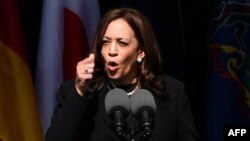American leaders spoke soberly on Saturday about how the events of September 11, 2001, forever changed them, their country and the world, in a series of somber commemorations of the 20th anniversary of the worst terrorist attack in modern history.
In a series of speeches, they urged Americans to embrace the unity that defined the days after that attack.
“On the days that followed September 11th, 2001, we were all reminded that unity is possible in America,” said Vice President Kamala Harris, speaking in Shanksville, Pennsylvania, the crash site of United Airlines Flight 93, which killed all 44 people on board after passengers revolted against the hijackers. “We were reminded, too, that unity is imperative in America. It is essential to our shared prosperity, our national security, and to our standing in the world.”
Former president George W. Bush, joining her in Shanksville, spoke movingly of the event that defined his presidency.
“For those too young to recall that clear September day, it is hard to describe the mix of feelings we experienced,” he said. “There was horror at the scale of destruction, and awe at the bravery and kindness that rose to meet it. There was shock at the audacity of evil, and gratitude for the heroism and decency that opposed it.”
The attacks led him to launch the Global War on Terror, which stretched over nearly 20 years, making it the nation’s longest war and claiming the lives of thousands of American service members and countless civilians in Iraq and Afghanistan. U.S. President Joe Biden drew the conflict in Afghanistan to a decisive end last month, withdrawing all military and diplomatic personnel.
In his remarks, Bush noted that the American people are capable of coming together in the worst of circumstances.
“In the weeks and months following the 9/11 attacks, I was proud to lead an amazing, resilient, united people,” he said. “When it comes to the unity of America, those days seem distant from our own. Malign force seems at work in our common life that turns every disagreement into an argument, and every argument into a clash of cultures. So much of our politics has become a naked appeal to anger, fear and resentment. That leaves us worried about our nation and our future together.”
His calls for unity echoed those issued by President Biden on the eve of the anniversary. In pre-recorded comments, Biden used the grave occasion to call again for unity in an increasingly divided America, where intelligence officials have identified domestic terrorism as a serious threat.
“Unity is what makes us who we are,” he said. ”America at its best. To me, that's the central lesson of September 11th: is that, at our most vulnerable, in the push and pull of all that makes us human, in the battle for the soul of America, unity is our greatest strength. Unity doesn't mean we have to believe the same thing. We must have a fundamental respect and faith in each other and in this nation.”
In Shanksville, Harris walked through that crash site on the sunny Saturday morning dawned over this dark anniversary. She stopped to read some of the names on the memorial, before proceeding to a private wreath-laying ceremony with families of the victims.
In her remarks, she stressed that unity doesn’t mean conformity.
“In America, our diversity is our strength,” said Harris, who is the first woman to serve in that role, and also the first Black American and Asian American in the job. “At the same time, we saw after 9/11 how fear can be used to sow division.”
Biden, traveling separately, walked slowly through the same field a few hours later, first lady Jill Biden by his side. Both wore black.
And at Ground Zero in New York, family members took turns reading aloud the names of the victims in alphabetical order. They started shortly after the 8:46 ringing of a bell to mark the time American Airlines Flight 11 crashed into the North Tower of the World Trade Center — and where, 17 minutes later, United Airlines Flight 175 hit the South Tower.
Family members also offered personal memories about lost spouses, siblings, parents and grandparents — some of whom they never got to meet before their deaths. Some wept, embraced and visibly struggled to get through all 2,977 names, which does not include the 19 hijackers who died by murder-suicide in the attacks.
As the afternoon began Saturday, they were still reading the names.




